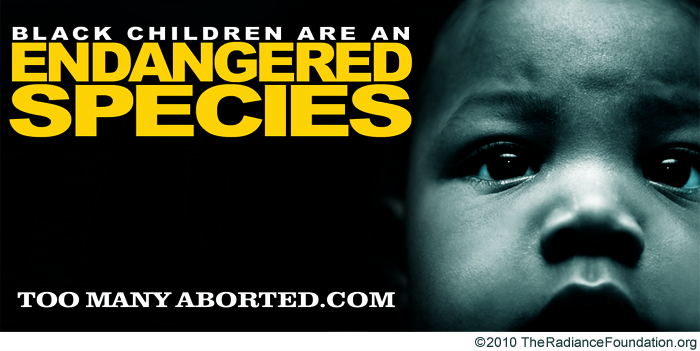
Dozens of billboards throughout Atlanta announcing “Black children are an endangered species” and featuring a picture of a black baby quickly created a media storm that has spread throughout the nation and even abroad.
The attention-grabbing advertisements are part of a new pro-life campaign organized by the Radiance Foundation’s “Too Many Aborted” project. It aims to highlight the racist motivations of some abortion promoters — particularly Margaret Sanger, the notorious founder of Planned Parenthood and “The Negro Project,” a eugenics plan to reduce the population of “undesirable” people.

“Women are being lied to by … Planned Parenthood,” explained Ryan Bomberger, co-founder of the Radiance Foundation and one of the leaders of the initiative. “That’s what toomanyaborted.com is about. It’s about exposing these things — using the facts — using Margaret Sanger’s own words.” He is the son of a mother who was raped yet chose life and gave him “the opportunity to love and be loved” by putting him up for adoption, he said.
In an interview with The New American, Bomberger said that the aim of the billboard campaign was not to target black women, but to expose an industry that targets blacks. “We emphasize how abortion is a tragedy, it’s a human issue, it’s not race-specific,” he said during an interview on the Laura Ingraham radio show. “This campaign was launched, however, because of the extreme disparity in the numbers.” Ingraham read a collection of Sanger quotes during the segment that drove home the point.
The billboards have quickly made headlines across the nation and beyond, with stories appearing in the Associated Press (AP), the New York Times, and even news outlets in Canada and Asia.
“Even with all of the mainstream media bias, it’s causing people to talk about the alarming statistics — across all demographics,” Bomberger told The New American by e-mail, noting that he was grateful for the coverage the campaign has received. “The media’s propensity for division has been more than apparent, however, especially local news stations. Their headlines and obvious bias suggest and have even accused us of racism, which is preposterous considering the creator/owner of the campaign is as black as Obama and those leading the charge with this initiative (to the press and in the Georgia community) are all African-American.”
The campaign is also having an effect on the political scene. Georgia Right to Life, a group which is also sponsoring the ads, is working at the state level to pass legislation that would prohibit race-based abortions. Shortly after the “endangered species” campaign began, a law to do just that was introduced in the legislature: It is called the “Prenatal Nondiscrimination Act.”
Other pro-life groups around the country have celebrated the ads and the strategy, suggesting that the message be spread nationwide. “The Sanger conspiracy has been undercover for too long…. So I’m hoping that these billboards will spread all over the place, and I know that there will be people trying to stop them, but everyone needs to understand this,” Our Lady of Consolation’s Respect Life coordinator, Jackie Sikes, told The New American from nearby Florida.
But critics have lashed out at the billboards for bringing race into the debate. “The language in the billboard is using messages of fear and shame to target women of color,” claimed Leola Reis, a spokeswoman for Planned Parenthood of Georgia, who was quoted by the AP. “If we want to reduce the number of abortions and unintended pregnancies, we need to work as a community to make sure we get quality affordable health care services to as many women and men as possible.”
Beverly Guy-Sheftall, a feminist “women’s history” professor at the historically black Spelman College in Atlanta, also blasted the ads. “These one-issue approaches that are not about saving the black family or black children, it’s just a big distraction,” she told the AP. “Many black people don’t know who Margaret Sanger is and could care less.”
According to the U.S. Centers for Disease Control and Prevention, black women are about three times more likely to have an abortion than white women nationally. In Georgia, blacks represent about one-third of the population yet accounted for more than 57 percent of all abortions in the state.
“Georgia leads the country in the number of reported abortions performed on black women; 18,901 in 2008 alone,” said Catherine Davis, Director of Minority Outreach for Georgia Right to Life.
The campaign’s website provides a vast array of information and resources for people whose interest is captured by the message on the billboards. “American elites (Rockefeller, Ford, Kellogg, Carnegie) championed and funded the beliefs of eugenics, a philosophy of breeding a superior race. It called for the prevention of procreation of the ‘unfit,’” explains the site. “This pseudo-science cult created organizations and policies based upon this ignorance. The Negro Project was one of those efforts, spearheaded by Planned Parenthood’s founder, Margaret Sanger, to eliminate the ‘unfit.’”
The controversy over Sanger’s views on eugenics has been largely suppressed in the mainstream debate about abortion, but it has recently been making its way back to the forefront. The documentary film Maafa 21 documents the “black genocide” extensively. And pro-life activists say that if the truth were widely known, Americans would be outraged.
In 2007, Planned Parenthood unconstitutionally received 350 million U.S. taxpayer dollars and performed over 300,000 abortions. Critics call this is an outrage, saying that it should upset even firm believers in the “right to choose.” Why can’t Americans at the very least choose not to fund what many believe to be murder of innocents?
Government should immediately stop all funding of Planned Parenthood — it is unconstitutional, and it is monstrous. Hopefully this billboard campaign will bring the debate and its eugenics underside back into the spotlight. Polls show that a majority of Americans consider themselves pro-life. Now is the time to translate the momentum into political action.



